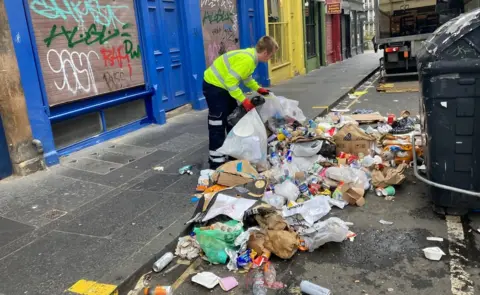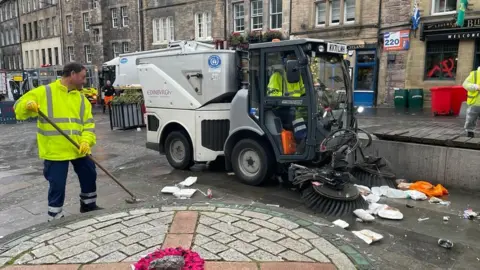Scottish government 'cannot offer' more money to end pay dispute
The Scottish government "cannot offer" any more money to help resolve the ongoing council worker pay dispute.
Deputy First Minister John Swinney said "people needed to understand there were finite limits" on finances.
The GMB, one of the three unions whose workers have been on strike, said more had to be done for low-paid staff.
The offer to local government employees consists of a 5% pay rise and a £1,925 uplift split between one-off payments and consolidated salary.
At the beginning of the month, the government allocated an extra £140m to help settle the dispute which has seen bin workers in many parts of Scotland on strike over the past fortnight.
A further £200m was also made available over two years to provide a cost-of-living payment to those earning below £39,000.
However, the three unions involved - Unite, Unison and the GMB - are seeking a similar offer to the one made to council workers in England - which included a £1,925 flat-rate pay rise.
A first wave of industrial action by refuse collectors began on 18 August in Edinburgh with staff at many more councils joining the walkout on 24 August and 26 August.
A second wave of strikes, scheduled to begin on 6 September, will not only involve bin workers but staff at schools, nurseries and early learning centres.
After speaking to union leaders on Tuesday afternoon, Mr Swinney told BBC Radio Scotland's Drivetime programme there was no more money.
He explained: "I can't do that [make more money available] because people have to understand there are finite limits on the government's finances and I have already dug very deep to provide recurring funding.
"I have managed to find one-off sums of money to ensure that people on low incomes are able to get a £2,000 increase in their salary now. But the government cannot offer any more money."
'Pockets of the highest paid'
Mr Swinney added that the "only other thing the government can do is cancel existing policy commitments and that will undermine some of the measures that are in place to protect people from the cost of living".
Keir Greenaway of the GMB union acknowledged the government's position but added that the existing offer was not as "good as it gets".
He said: "It can be better for the lowest paid frontline workers in local government, if the offer puts more consolidated money into their salaries instead of the pockets of the highest paid."
Cosla, the body which makes the offer on behalf of local councils, will meet on Friday to discuss the situation further.
A huge clear-up operation got under way in Edinburgh on Tuesday after 12 days of strike action ended.
But the council said many residents would not have their full backlog of waste collected before the next round of action on 6 September.
People are being asked to store their rubbish "a little longer" while staff catch up.
The 140,000 households that have kerbside pickups in the city have landfill waste and dry recycling waste collected on alternate weeks.
The council said only one type of rubbish would be picked up per household.
Bin strikes continue into the early hours of Thursday, 1 September in 13 other local authorities - Aberdeen, Angus, Dundee, East Ayrshire, East Lothian, East Renfrewshire, Falkirk, Glasgow, Highland, Inverclyde, South Ayrshire, South Lanarkshire and West Lothian.

City centre a 'nightmare'

By Angie Brown, BBC Scotland Edinburgh reporter
I saw the first signs of the great clean-up of Edinburgh when I reached the West Port from the south of the city this morning.
A young refuse collector was filling a large black street bin with bags full of rubbish for the fourth time that hour.
He said it was a "nightmare" task as the bin lorry, which mechanically empties the large street bins, only had a certain capacity.
He said he was filling the bin with all the bags piled beside it before waiting until the lorry had emptied it before starting again.
The driver told me his young colleague would be "exhausted within an hour at this rate".

The driver also said a one-hour job was taking four hours because they normally only had to empty each bin once.
He said it was the worst he had ever seen, and that they would not have the city centre cleaned up by the end of their 12-hour shift.
Cleansing workers then cleared the loose rubbish left on the street with road sweepers and manually with brushes.
One road sweeper said they would try their best to get as much of it cleaned as possible but that it was a "mammoth task".
Cleansing staff later in the day in the West Port said it was "disgusting" work.
They also said the strike had been hard and they had all lost money but that "you have to lose a bit of money to make a bit of money".
